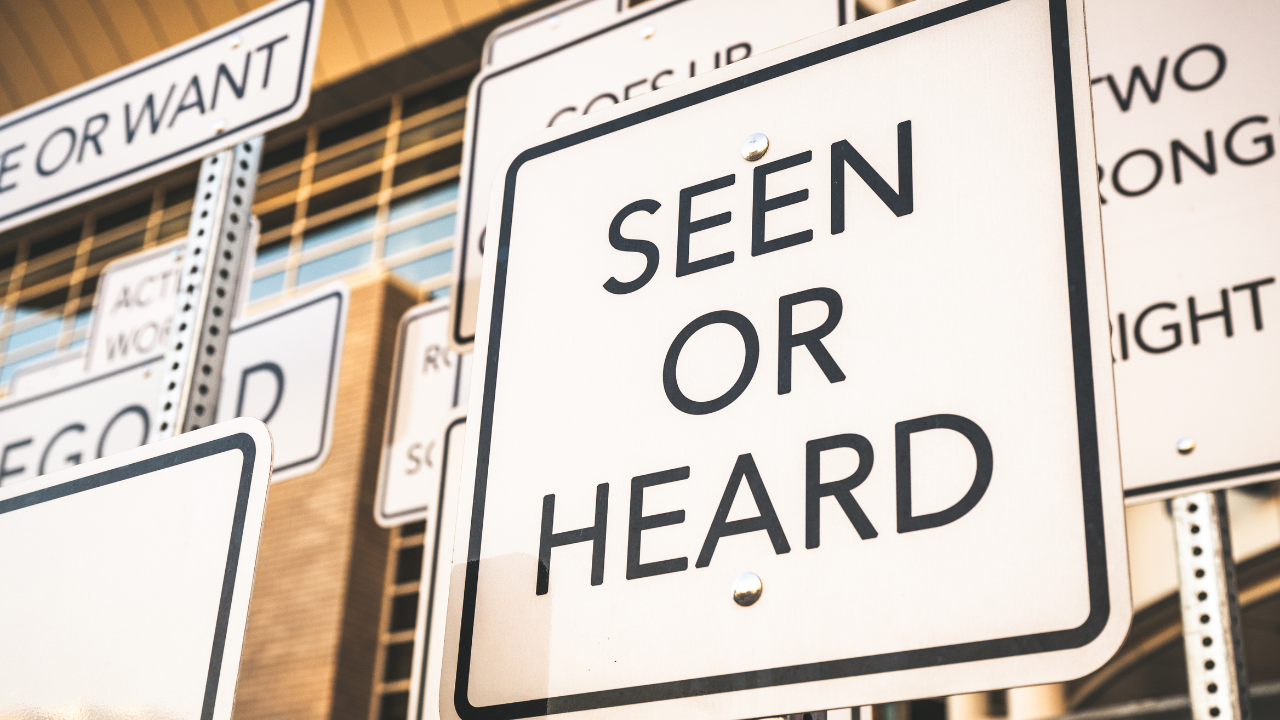The structural threat of invisibility
Apr 10, 2025
Most business owners, creatives, and changemakers understand the importance of visibility - if not at the beginning of their journey, then over time. It’s not just a marketing strategy; it’s the key to sustainable success. Without visibility, potential customers, supporters, or allies don’t know you exist, and without engagement, they won’t trust you enough to buy, contribute, or take action.
But visibility isn’t only about business growth or influence. It’s a fundamental human need.
Being heard isn’t just about validation - it’s about psychological safety.
Developmental psychology shows that babies who receive consistent, responsive care develop a secure sense of self, while those who are ignored experience distress.1
Neuroscience reinforces this: when people feel dismissed, the brain registers it as a threat, triggering the amygdala (the fight-or-flight response). Being unheard is not just frustrating; it’s a survival-level stressor. Our brains are wired for connection, and social rejection activates the same neural pathways as physical pain.
There are many ways to respond to this. This article, for example, will interest all who work in meditation, mindfulness, breathwork and/or yoga. It shares research findings that, I’m sure, align with your lived experience - that people who practice mindfulness report significantly less distress following social rejection experiences. Additionally, increased mindfulness is associated with lower activation in a part of the prefrontal cortex, which means that the more mindful we are, the less rejection disrupts our brains.

Certainly, much of our core work at The School of Visibility® is focused on healing the wounding associated with feeling unseen and unheard so that you can be visible without feeling triggered, traumatised, or terrified.
But what of people who don’t know how to respond healthily to feeling unseen or unheard? What of people who don’t have these tools?
A few of the psychological responses associated with feeling unseen or unheard include:
-
Feeling sad, frustrated, angry, which can escalate into depression and anxiety
-
An erosion of an individual's self-confidence and sense of worth, leading to feelings of insignificance
-
Feeling lonely and disconnected, even in the presence of others.
Some of our behavioural responses include:
-
Retreating from social interactions, leading to increased isolation
-
Exhibiting irritability or anger, expressing their frustration through confrontational behaviours
-
Engaging in harmful activities, such as substance abuse, as a coping mechanism.
When people feel dismissed, their need to be heard doesn’t go away, it intensifies. They become more trusting of anyone who offers recognition, even if that person has ulterior motives or a dangerous agenda.
People’s concerns don’t disappear when they are ignored, they persist in their need for connection and validation, moving toward those who will listen.
This becomes a very significant problem - for individuals, families, communities, and nations - when the people they connect with are acting in bad faith.
Within families
Consider the teenager struggling with mental health or identity issues who feels dismissed by their parent(s). If their emotions are minimised (“You’re just being dramatic,” “You’ll grow out of it”), they can retreat into online spaces where bad-faith actors exploit their vulnerability. They may be drawn into extremist ideologies, predatory online groups, or conspiracy theories that offer validation, a sense of belonging, and an explanation for their pain.

Within communities
A community facing long-term economic neglect, resulting in job losses, housing instability, or underfunded schools, may feel unheard by politicians or local leaders. If their struggles are dismissed, or they see corruption, or a small number of people succeeding while they are left behind, resentment builds. This makes them vulnerable to exploitative leaders, conspiracy movements, or extremist groups who offer simple but dangerous explanations, pointing the finger at scapegoats rather than addressing real systemic issues. These bad-faith actors fuel resentment by blaming immigrants, Jewish people, LGBTQIA+ communities, or so-called 'woke elites,' rather than acknowledging the structural causes of economic decline.
In each case, the pattern is the same: when legitimate concerns are dismissed, people seek alternative sources of validation, and if bad-faith actors step in, they shape that person’s worldview in harmful ways. The impact ripples through families, leading to fractured relationships, loss of trust, and increasing polarisation between generations and ideologies.
This pattern is nothing new, but digital technology has amplified it, accelerating radicalisation and deepening social divides.
1930s Germany
After World War I, many Germans - especially unemployed workers and returning soldiers - felt unheard, abandoned by their government, and resentful of the Treaty of Versailles. Mainstream politicians failed to address their concerns, leaving a vacuum that Adolf Hitler exploited. The Nazi Party provided recognition, telling struggling Germans: You are not the problem; the system is. This deep emotional appeal - built on lies and scapegoating - led to mass mobilisation and ultimately to the Holocaust, in which six million Jews were murdered, along with millions of others (including Romani people, disabled individuals, and political dissidents).
QAnon and online radicalisation
Many people drawn to QAnon initially felt ignored, frustrated by political corruption, economic instability, or personal hardships that mainstream institutions failed to acknowledge. The movement gained traction by validating these frustrations and offering followers a sense of belonging and secret knowledge. Leaders positioned themselves as the only ones telling the truth, reinforcing distrust of media, experts, and even family members. As individuals became more isolated from traditional sources of information and connection, they became deeply embedded in a harmful ecosystem that distorted their reality and has, in some cases, resulted in acts of violence.

Autonomy, vaccines, and misinformation
Many people who prioritise wellness and holistic health (including me) approach medicine with a desire for informed choice and open dialogue. Within this group, some are particularly concerned about vaccine safety, potential side effects, whether certain vaccines are necessary in all cases, and how vaccination policies intersect with bodily autonomy. Unfortunately, these questions are often met with dismissal or a lack of meaningful engagement from medical professionals, leading to frustration and eroded trust.
When people feel unheard, they can lose trust in the medical profession and seek answers elsewhere. In some cases, this leads to a more holistic understanding of well-being and encourages individuals to take an active role in their health. However, these same spaces are also vulnerable to bad-faith actors who exploit uncertainty and spread misinformation, deepening distrust in science, vaccines, and conventional medicine. Some figures deliberately manipulate fears, offering false certainty in place of balanced, evidence-based discussions.
The result is not just personal health risks but a broader public health crisis. One exacerbated by a healthcare system that, too often, has failed to engage respectfully and transparently with people’s concerns.
The threat to democracy
We’re also seeing, day by day, in vivid 3D, the impact of this pattern on democracy. Each time people feel unseen or unheard and are driven into the arms of bad-faith political actors, the strain on democracy deepens. A society where people feel unheard is a society vulnerable to manipulation, radicalisation, and fragmentation.
Democracy doesn’t just rely on elections and institutions - it relies on the belief that people’s voices matter. When that belief erodes, so does the foundation democracy stands on.
The structural threat of invisibility
The consequences of invisibility extend far beyond personal frustration. They pose a structural threat to families, communities, and entire societies. When people feel unseen and unheard, they don’t simply disappear. Their grievances, fears, and desires persist, driving them toward whoever will listen. And when bad-faith actors step in, the damage spreads - fracturing relationships, undermining trust, and destabilising democracies.
Ignoring people doesn’t make their concerns go away, it determines who they turn to next.
If we want to build a more just, cohesive, and resilient world, we must take visibility seriously - not just as a business strategy or a social nicety, but as a foundational pillar of psychological safety, collective well-being, and democratic stability.
1 I’ve observed that some women interpret this research through the lens of an old patriarchal story - that mothers must sacrifice everything for their children and run themselves into the ground in the name of attachment parenting. But that’s not what the research says. Secure attachment is built through consistent, responsive care, not through perfection or self-erasure. Remember, a well-supported, resourced caregiver is just as crucial to a child’s well-being as the care they provide.




